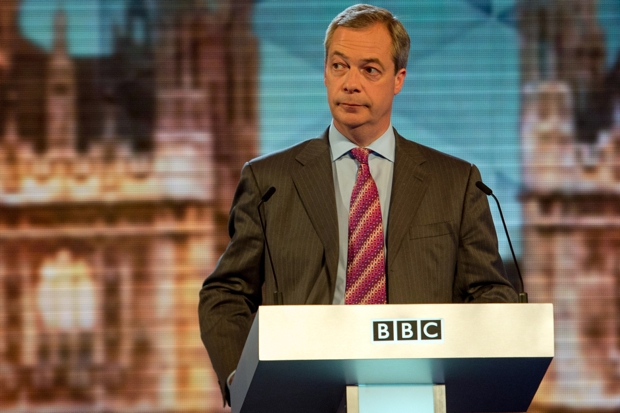The BBC opposition leaders’ debate wasn’t great political theatre, but it did turn into a fascinating experiment in human behaviour. A third of the way through, Nigel Farage suddenly imploded, attacking the BBC for putting together a left-wing audience – which he then went onto to insult and dismiss as an irrelevance, the real audience being at home.
On this occasion, Farage was almost certainly wrong about BBC bias. I am sure that David Dimbleby was telling the truth when he said that the audience had been put together by a polling company to reflect the balance of voting intentions. And yet Farage was right to detect that the audience, which had initially received him with applause, had started to turn against him. It wasn’t because of anything he said – his contentious bits, trawling up once again his point about foreign HIV patients, had yet to come.
The audience swung because, although it had itself been handpicked to represent the balance of nationwide political opinion, the same was not true of the people on the stage. In fact, it was ludicrously unbalanced, with Ed Miliband, three party leaders who stand well to the left of Ed Miliband and just Nigel to represent the right. The impression it gave, especially with Nigel symbolically out on the right wing, was that the centre of gravity of British political debate lies with people who believe the answer to a £90 billion deficit is to spend even more money – another £200 billion a year in the case of the Greens.
The audience shifted subtly to match the make-up of the panel. Any statement about ending austerity came to attract applause. There was similar applause over any statement which praised migrants. On the other hand, the audience went stony silent when Ed Miliband – never mind Farage – declared that immigration need to be brought under control.
This suggests an incredibly different field of opinion than we know to exist among the general population, where immigration comes up again and again as a hugely important issue. As Fraser Nelson observed, the audience groaned when Farage made a partial link between the housing shortage with immigration, yet the figures suggest a pretty stark link: housebuilding at fewer than 150,000 new homes a year; net immigration of 300,000. Of course there is a link between housing shortage and immigration, even if you are minded to blame the planning system rather than migrants.
While Farage went down badly in the hall, the Survation poll told a very different story, with 27 per cent feeling that Farage had won the debate. How come? People react very differently when they are subject to group emotion than when they are watching the television at home on their own. If Billy Graham was watching he would have understood exactly what was going on.







Comments